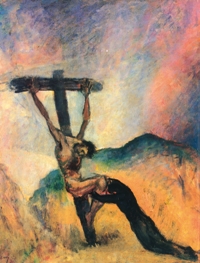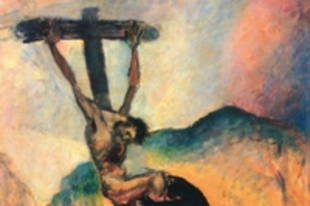 „The Last Days Of Mankind”, vagyis „Az emberiség végnapjai” címmel rendeznek kiállítást a századelő Monarchiájának művészetéből 2014-ben, a londoni Royal Academy of Arts-ban. A jól ismert bécsi festők mellett a korabeli magyar művészetre koncentrálna Peter Vergo, a kiállítás kurátora. Az Essexi Egyetem művészettörténésze a nyáron tartott előadást a Szépművészeti Múzeumban. A magyar kultúrát az elmúlt években megismerő és megszerető angol professzorral a MúzeumCafé folyóirat számára készítettem ez alkalomból egy interjút, amely a lap aktuális, 26. számában jelent meg.
„The Last Days Of Mankind”, vagyis „Az emberiség végnapjai” címmel rendeznek kiállítást a századelő Monarchiájának művészetéből 2014-ben, a londoni Royal Academy of Arts-ban. A jól ismert bécsi festők mellett a korabeli magyar művészetre koncentrálna Peter Vergo, a kiállítás kurátora. Az Essexi Egyetem művészettörténésze a nyáron tartott előadást a Szépművészeti Múzeumban. A magyar kultúrát az elmúlt években megismerő és megszerető angol professzorral a MúzeumCafé folyóirat számára készítettem ez alkalomból egy interjút, amely a lap aktuális, 26. számában jelent meg.
„I find the Hungarian language absolutely fascinating, but of course, the language is a barrier. The Hungarian literature is not very well known in foreign countries. Not too much of it is translated into other languages either. Many people say that the Hungarian language is impossible to learn. It is not impossible at all, it is a beautiful language, and I started to learn it. Now I can read Ady, but slowly (he laughs). The other great artist I admire is Béla Bartók. I emphasised in my lecture, that from start to finish, Bartók’s individual voice remains distinctively, unmistakably Hungarian. For a time, his music seemed new enough and challenging enough to startle and even alienate audiences; yet it was also deeply rooted in the soil of his homeland. Without the vital inspiration of Hungarian and Rumanian folk melody, it would have been very different. On the other hand, the question whether or not we are struck by the Hungarianness of Bartók’s music is, in a sense, irrelevant, since his works have long since taken their rightful place on the stage of world music. In my lecture I raised a question: hasn’t the time now come for the wonderful Hungarian modern painters to take their proper place on the stage of world art? Isn’t it time for the »Lost Rider« of Hungarian painting to find his way back home: back into our consciousness of the mainstream of modern European art?”
A MúzeumCafé szíves engedélyével közöljük Globál rovatunkban az interjú eredeti, angol változatát.






